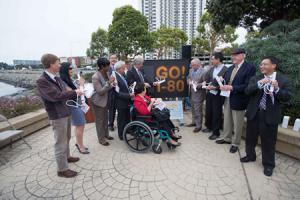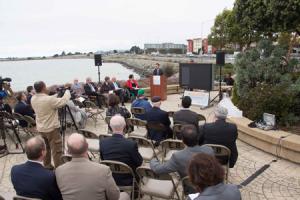As many as 270,000 vehicles per day use the I-80 corridor, one of the busiest in the Bay Area. The I-80 SMART Corridor Project (I-80 Integrated Corridor Mobility), activated in 2016, represents the most comprehensive Intelligent Transportation Systems in the state. The project implemented a network of integrated electronic signs, ramp meters and other state-of-the-art elements along the 20-mile corridor between the Carquinez Bridge and the Bay Bridge to enhance motorist safety, improve travel time reliability and reduce accidents and associated congestion.
Real-time traffic information, including variable advisory speed signs and blocked lane signs, allow drivers to make informed decisions in the event of an incident. Ramp meters and real-time message signs along the corridor contribute to optimized roadway operations and improved safety, and are integrated with, and managed from, the Traffic Management Center at the Caltrans Bay Area headquarters in Oakland. Additional improvements include adaptive ramp metering on 43 on-ramps to reduce merging conflicts and manage traffic volumes on I-80.
Have you seen the big electronic signs on westbound Interstate 80 (Eastshore Freeway) between the Carquinez Bridge and the Bay Bridge?
Adaptive Ramp Metering
Every on-ramp along the corridor is metered (a total of 43 ramps), using adaptive ramp metering, which is a “smarter” approach to ramp metering. It uses an algorithm that considers freeway and ramp volumes and then adjusts the rates accordingly for optimal flow along the entire corridor. Queue spill-back detectors at on-ramps prevent possible spill back onto local streets so as not to impact arterial operations, and faster metering rates are utilized to ensure ramp queues are cleared if they extend beyond the queue spill-back detectors. Adaptive ramp metering optimizes the flow of traffic, reduces accidents by reducing merging conflicts, reduces overall corridor delay, and facilitates safe and convenient merging as vehicles enter the freeway.
Incident Management
As part of incident management, real-time information is provided to motorists using electronic changeable message signs, variable advisory speed signs, and informational message signs. Real-time traffic information allows drivers to make better choices during their trip regarding route and mode to reach their destination, which result in more reliable expectations regarding travel times.
For additional project information, visit http://www.dot.ca.gov/80smartcorridor/
Caltrans and Alameda CTC, in collaboration with the Contra Costa Transportation Authority and the West Contra Costa Transportation Advisory Committee, held a ribbon cutting ceremony for the Interstate 80 ICM Project on September 19, 2016 in Emeryville.
“By making I-80 smarter, we are making it work better for everyone — commuters, goods movement, transit, carpools, and local road users,” said Alameda CTC Chair Rebecca Kaplan at the ribbon cutting. “The commitment of local voters who passed both the Alameda and Contra Costa County sales tax measures, as well as the state bonds in 2006, is what made this critical work possible. We are proud to work together to bring these solutions to our communities to make sure people can reliably get where they need to go — to work, to education or to families.”
Caltrans and Alameda CTC, in collaboration with the Contra Costa Transportation Authority and the West Contra Costa Transportation Advisory Committee, held a ribbon cutting ceremony for the Interstate 80 ICM Project on September 19, 2016 in Emeryville.
“By making I-80 smarter, we are making it work better for everyone — commuters, goods movement, transit, carpools, and local road users,” said Alameda CTC Chair Rebecca Kaplan at the ribbon cutting. “The commitment of local voters who passed both the Alameda and Contra Costa County sales tax measures, as well as the state bonds in 2006, is what made this critical work possible. We are proud to work together to bring these solutions to our communities to make sure people can reliably get where they need to go — to work, to education or to families.”
Draft Initial Study Environmental Assessment - 2011
The Draft Initial Study Environmental Assessment (Draft IS/EA) for the Interstate 80 Integrated Corridor Mobility (ICM) project was available for a 30-day public review and comment period in 2011. Electronic files of this draft environmental document are available online at www.dot.ca.gov/d4/envdocs.htm. Please note, the public comment period has ended.
Open houses were held in May 2011 at the Albany Senior Center and at San Pablo City Hall. For more information about the project and the public meetings, see the documents below or visit http://www.dot.ca.gov/dist4/envdocs.htm.
- Public notice
- Project fact sheet
- Letter from Caltrans to libraries
- Email from Caltrans and Alameda CTC
- San Pablo Corridor Construction Outreach Notice
Groundbreaking - October 19, 2012
Caltrans and Alameda CTC, in collaboration with the Contra Costa Transportation Authority and the West Contra Costa Transportation Advisory Committee, held a groundbreaking ceremony for the Interstate 80 ICM Project on October 19, 2012 at Shorebird Park in Emeryville. See the photos of the event below.
“Safer and more efficient and reliable traffic flows along I-80 are essential to the current and future vitality of the Bay Area,” said Alameda CTC Chair Mark Green, at the project groundbreaking. “Alameda CTC is working to ensure that county and regional transportation systems will run as smoothly as possible and keep up with demand as the Bay Area’s population grows—using high-tech solutions to increase capacity on our existing roadways. This project means time savings and greater convenience for Bay Area residents and businesses that rely on the I-80 corridor.”
Ribbon Cutting Celebration - September 19, 2016
“By making I-80 smarter, we are making it work better for everyone — commuters, goods movement, transit, carpools, and local road users,” said Alameda CTC Chair Rebecca Kaplan. “The commitment of local voters who passed both the Alameda and Contra Costa County sales tax measures, as well as the state bonds in 2006, is what made this critical work possible. We are proud to work together to bring these solutions to our communities to make sure people can reliably get where they need to go — to work, to education or to families.”
All photos by John Huseby/Caltrans




Construction Photos
- Construction Photographs 1 (added 9/2014)
- Construction Photographs 2 (added 9/2014)
- Construction Photographs 3 (added 3/2015)
Videos
Learn more about the project components of this $79 million I-80 ICM Project, which is funded largely by the Corridor Mobility Improvement Account and the Traffic Light Synchronization Program—both created by State Proposition 1B. Approximately $2.8 million of the total project is funded by the Alameda County Measure B half-cent sales tax, and $5 million by Contra Costa County Measure J half-cent sales tax. The Bay Area Air Quality Management District's Transportation Fund for Clean Air contributed $1 million.


